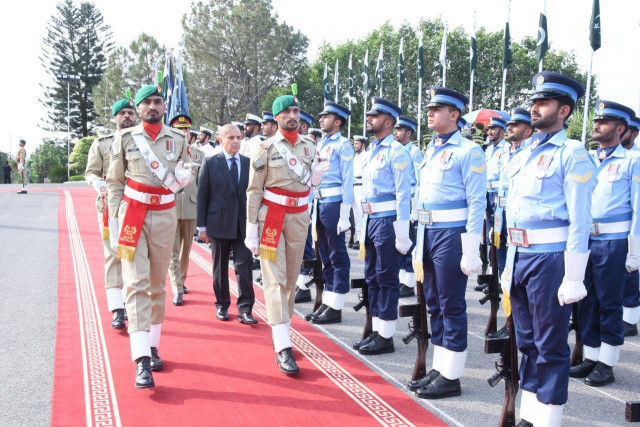Govt, powerful stakeholders not seeing eye to eye
PML-N leader says stakeholders should think about the current crises instead of resorting to arm-twisting

The future of the coalition government is hanging by a thread as serious differences seem to have emerged between the multi-party government and the country’s powerful stakeholders, it emerged on Thursday.
If the statements of several leaders of the coalition government, as well as the political experts, are to go by it is evident that the main point of contention is the duration of the incumbent government’s tenure.
The government is ready to take tough decisions but only on the condition that it will serve the remaining constitutional term in office without any hindrance or intrigues.
However, developments during the last couple of days suggest that the powerful quarters are now increasingly inclined towards holding early elections in the country – a phenomenon that suddenly emerged, and embroiled the government and the powerful quarters in a dispute.
The stalemate between the government and stakeholders is not only becoming visible with every passing day but causing delays in the decision-making process of the government and, thus, affecting the economy and the country itself.
It was because of this reason that the coalition government was reluctant to take tough economic decisions, including ending fuel subsidy which the International Monetary Fund (IMF) has linked with the revival of the loan programme.
The uncertainty coupled with former premier Imran Khan’s planned rally and sit-in in the capital has also pushed Prime Minister Shehbaz Sharif to repeatedly postpone his address to the nation where he is expected to present his economic plan.
Read PTI would still be in power if ties with establishment weren't fragile: Fawad
In fact, political analysts, while shedding light on the gravity of the situation, said that the prime minister could announce dissolution of assemblies instead of presenting the fiscal plan if not assured by the stakeholders that he would complete the remaining term.
Keeping the current situation in view, the coalition partners of the ruling party clearly conveyed to PM Shehbaz the other night that they would stand by the government if it takes tough economic decisions.
The allies reiterated their support for the government on Thursday night but opined that the government should complete the remaining tenure to ensure that the measures needed for stabilising the economy were completed.
The notion of ‘forcefully’ ending the government pushed the allies to the extent that they even floated the suggestion to summon a meeting of the National Security Committee (NSC) to discuss the issue in detail and reach a decision as the current situation was not suitable for stabilising economy and things would further deteriorate if caretaker government was tasked with taking tough decisions.
Since inception, the political experts say, the government has been mulling about deciding tenure of the government and the timeframe for the next elections but could not reach any decision as they do not have assurance from the stakeholders that they would be able to complete full term.
On Thursday, Pakistan Muslim League-Nawaz (PML-N) Vice President Maryam Nawaz, while speaking in Sargodha, dropped a major hint that the government might go for snap polls instead of doing the heavy lifting of economic mismanagement allegedly caused by the last Pakistan Tehreek-e-Insaf (PTI) government.
On ending fuel subsidy, Maryam said that her father and three-time former premier Nawaz Sharif says that he would leave the government but would not burden people – a clear hint that PML-N would prefer elections over a government standing on crutches.
In a series of questions, she asked the rally participants should PML-N take the blame for PTI’s bad performance and should PML-N stay in government or leave it. “It would be better to say goodbye than taking the blame for the poor performance of the previous government,” she herself answered the questions.
She further asked the rally if they would give two-third majority to PML-N if it leaves the government; a question that ex-PM Imran has also been asking in public rallies organised to build up pressure on the government and the stakeholders for fresh elections at the earliest.
Another hint about the stalemate between Islamabad and Rawalpindi emerged when Pakistan People’s Party (PPP) Khursheed Shah clearly said that the coalition government was ready for the elections and they would be happy if the government was ended. “We would thank you for freeing us in just one month,” he said.
Read more Snap polls only solution to fix crumbling economy, says Umar
Several PML-N leaders also said that they were not in favour of a government standing with the support of crutches, saying the stakeholders should think about the current political and economic situation instead of resorting to arm-twisting.
Political experts also believe that the Supreme Court’s (SC) decision to bar the government from posting and transfers was also an indication that the government would not have the luxury of time and free hand at decision making, including amending the NAB law, if it moves ahead with tough economic decisions.
Apparently, the government is stuck between a rock and a hard place as the Election Commission of Pakistan (ECP) has already said that it cannot hold elections in the next few months and the stakeholders want them to go ahead with the fiscal measures without knowing the duration of their government. “Stakeholders cannot have it both ways,” they said.


















COMMENTS
Comments are moderated and generally will be posted if they are on-topic and not abusive.
For more information, please see our Comments FAQ